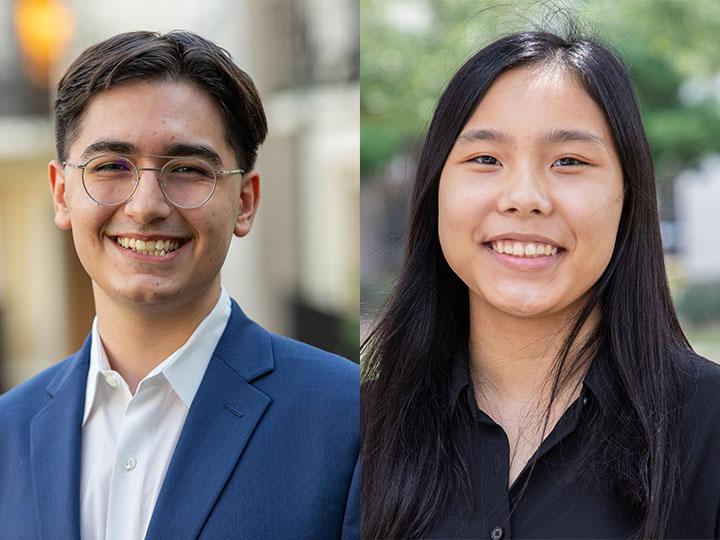Pharis Fellowship Student Features: Mielad Ziaee and Vivienne Pham

According to a study by the U.S. Department of Agriculture, 10.2% of the U.S. population faced food insecurity in 2021. Of this percentage, Texas had an overall rate above the national average, meaning that many Texan families — including those in Houston – struggled to put food on the table.
The George “Trey” Pharis Fellowship Program, offered by the Honors College’s Data and Society Program, is a 10-week summer undergraduate research program that provides students the opportunity to address the social determinants of health by curating projects at the intersection of data science principles and techniques. Student efforts are sponsored by the Hewlett Packard Enterprise Data Science Institute and the Humana Integrated Health System Sciences Institute.
UH undergraduates Vivienne Pham and Mielad Ziaee hoped to address issues of food security in the Houston area by exploring the challenges of food pantries and meal sites. Their initiative, supported by the Pharis Fellowship Program, delivered three research projects over the past summer. With the help of the Tilman J. Fertitta Family College of Medicine, the two undergraduates were able to collaborate with outside organizations, such as the Everybody Eats Program and the Patient Care Intervention Center (PCIC), to conduct their research.
Although Houston has several food pantries spread throughout the city, many areas still struggle with food insecurity. What’s going wrong? To find out, Pham and Ziaee evaluated the communication between several food pantries in Third Ward. The two worked on a rapid review of literature on the topic, finding that there was a lack of communication between organizations. Ultimately, this leads to a discoordination in food stock efficiency, making it difficult for pantries to provide food assistance to the public.
“What our project seeks to look into is: ‘What kind of communication models can these food pantries adopt to better communicate with each other to be more efficient – to save more food?’” Ziaee said. “There are definitely a lot of ways the project is heading and where we’re at now is just writing them out.”
It doesn’t just stop at communication. Pham and Ziaee had the opportunity to construct their own projects, looking at other possible contributions toward Houston’s food insecurity – transportation and accessibility. Using a logistic regression, Pham found that organizations place pantries without considering food-and-transportation-insecure populations. Similarly, Ziaee compared the placement of meal sites to the census data of bus and supermarket distances, determining that these sites weren’t being placed in areas of high need.
“Dr. David Buck and Linda Civallero were very helpful and receptive to all our ideas. They were wonderful to work with. Initially, it was nerve-wracking to work with a prestigious institution, but their willingness to work with us made the process much easier,” Pham said.
Moving forward, their project will explore many new avenues, potentially including cross-sector data sharing between food pantries and SNAP benefits.
“We obviously want to keep it in connection with (our own) separate projects,” Pham said. “The future route of our research may not build upon our previous work directly, but we hope it continues to have relevance in our future work.”